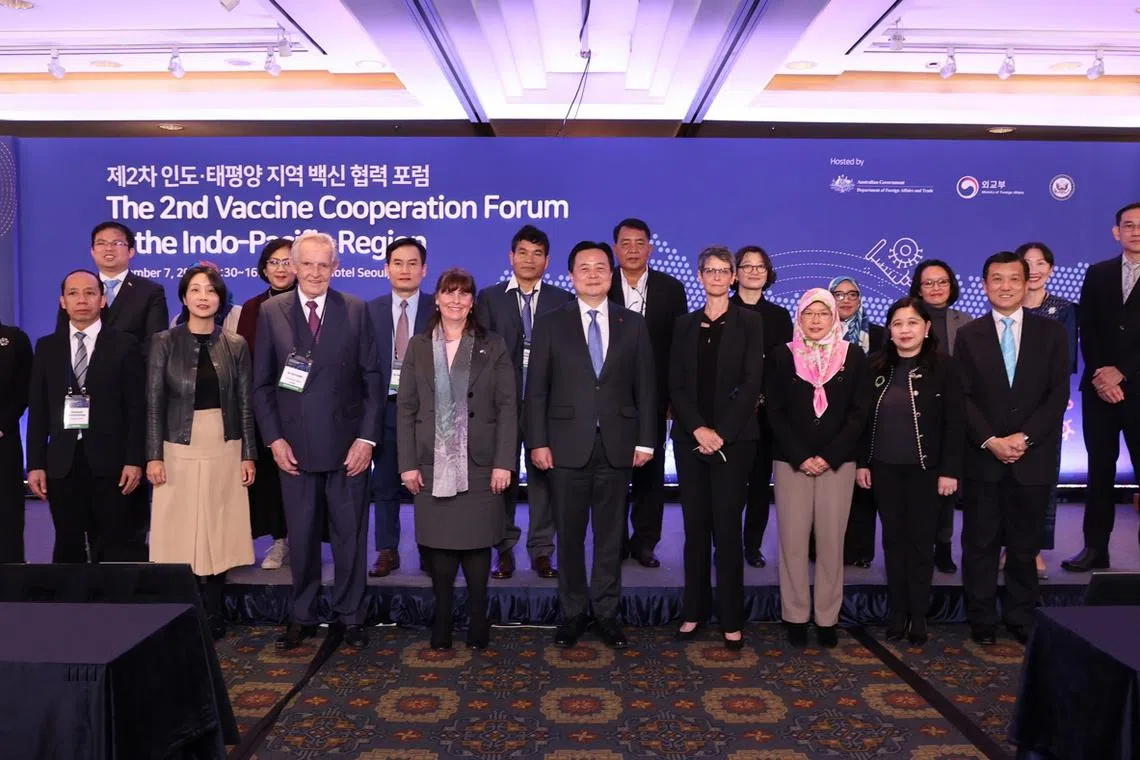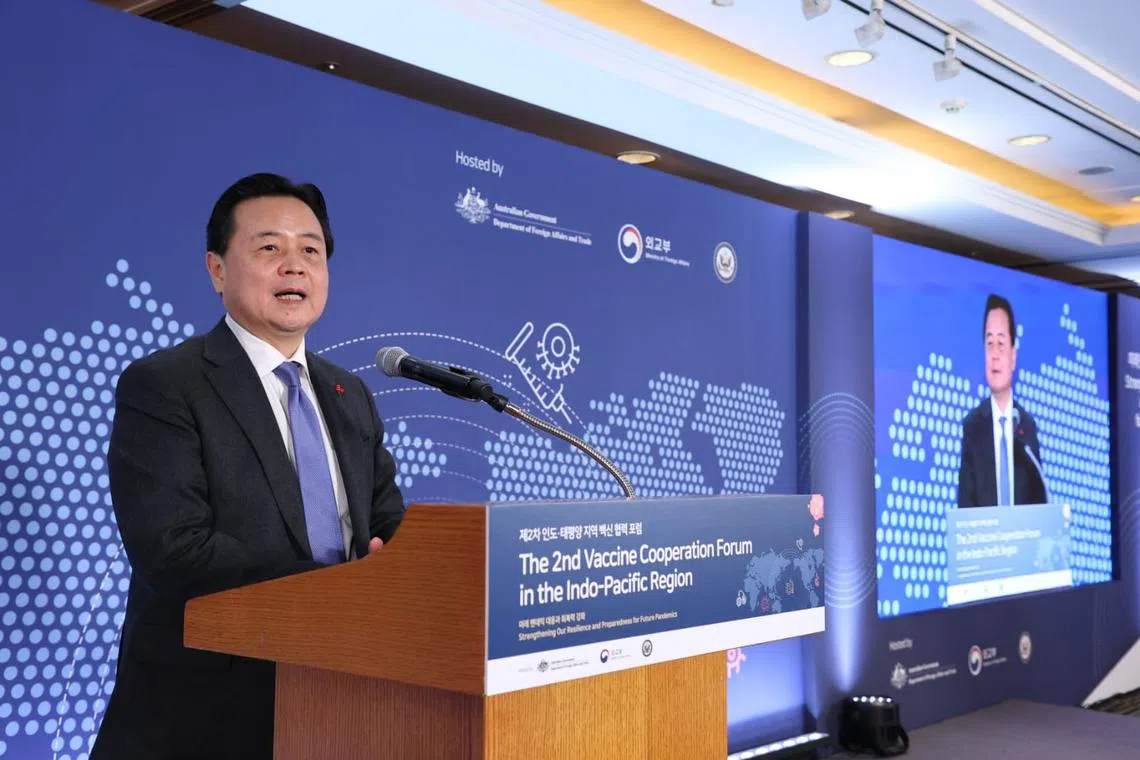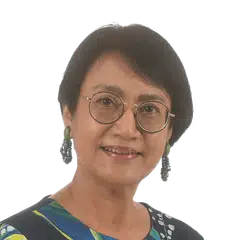Countries in region teaming up for next pandemic, breaking ‘cycle of panic and neglect’
Sign up now: Get ST's newsletters delivered to your inbox

Delegates at the 2nd Vaccine Cooperation Forum in the Indo-Pacific Region, held in Seoul on Dec 7, 2022.
ST PHOTO: SALMA KHALIK
Follow topic:
SEOUL - Countries in the region are joining hands and building up resources, such as in vaccine production, to prepare for the next pandemic.
They do not want to be caught off guard by future health crises.
Health representatives from Asean countries met recently in Seoul, and several spoke of the difficulties they faced in getting vaccines to protect their people as the pandemic raged.
Dr Sunate Chuenkitmongkol, deputy director of Thailand’s National Vaccine Institute, said countries learnt during the pandemic that as demand for vaccines far exceeded supply, the ”negotiation power of the supplier is bigger than that of the procurer”.
This meant that rich countries could get vaccines, while middle- to lower-income countries faced great difficulties. Vaccine nationalism also led to countries preventing the export of vaccines till their domestic needs had been met.
Dr Riamiza Momin, an infectious diseases consultant with Brunei’s Health Ministry, said the country does not have the capacity to manufacture vaccines, and its small size made it difficult to procure vaccines during the pandemic.
However, it was able to gain access to vaccines through regional and international cooperation, including with Singapore, China, Australia and Japan.
To ensure that they are better prepared for future emergencies, several countries gathered in December at the 2nd Vaccine Cooperation Forum in the Indo-Pacific Region, co-sponsored by South Korea, the United States and Australia.
Mr Cho Hyun-dong, South Korea’s Vice-Minister of Foreign Affairs, said in his opening address: “We need to take full advantage of our current cooperation to strengthen preparedness against future health crises.
“Over the past three years, we have experienced first-hand the importance of united action against the common threat of Covid-19. We have learnt the effectiveness of joint response and the importance of equitable access to vaccines and treatments.”
He spoke of how Asean nations launched the Asean Covid-19 Response Fund and the Regional Reserve of Medical Supplies, making a rapid regionwide response possible.
South Korea, he said, was one of the early contributors to the Asean Covid-19 Response Fund, providing US$6 million (S$8.1 million) towards the region’s detection capabilities.
The World Health Organisation (WHO) has appointed South Korea as a global biomanufacturing training hub for low- and middle-income countries looking to produce biologicals, such as vaccines, insulin, monoclonal antibodies and cancer treatments.

South Korea’s Vice-Minister of Foreign Affairs Cho Hyun-dong spoke of the importance of united action.
ST PHOTO: SALMA KHALIK
South Korea is the second country to be appointed by the WHO, after South Africa was named a global messenger RNA (mRNA) vaccine technology transfer hub. The Asian Development Bank and South Korea will bear the cost of training.
Training on vaccine production processes started in July, and so far, a total of 257 trainees from 38 countries across the Indo-Pacific have taken part in the programme, which provides technical and hands-on training on operational and good manufacturing practice requirements.
Mr Cho said South Korea looks forward to expanding this programme to further facilitate vaccine self-reliance in the region. More training facilities are being built and will come on stream in Andong city in 2025 and Hwasun county in 2026.
Mr Philip Goldberg, the United States’ Ambassador to South Korea, said in his welcome speech: “Investments that increase resilience and adaptability of health systems are much less costly than emergency responses.”
Countries need to “break this cycle of panic and neglect” – pouring in resources when there is a pandemic raging and withdrawing those resources once the immediate danger is over, he said. Instead, they need to commit to sustained investments in health systems.
Ms Catherine Raper, Australia’s Ambassador to South Korea, stressed the importance of cooperation during a pandemic. Australia, she said, had shared more than 52 million Covid-19 vaccine doses with regional partners to date, providing more than three million doses to countries in the Pacific and more than 49 million doses to South-east Asia.
She added that the pandemic has shown the importance of having a diversity of vaccine types and manufacturers, and welcomed the forum’s aim to “foster the networks and linkages to improve vaccine research, development and manufacturing in our region”.
Several Asean nations, such as Indonesia and Thailand, spoke of how their countries are ramping up vaccine production facilities.
Professor Benjamin Seet, a deputy group chief executive at the National Healthcare Group who led Singapore’s efforts to identify and procure vaccines against Covid-19, said Singapore does not have its own vaccine manufacturing.
However, several global players are setting up plants here.
Prof Seet said: “What we are trying to do is work with companies in Singapore on domestic and regional needs. The conversations we are having today are important (when another pandemic occurs).”


